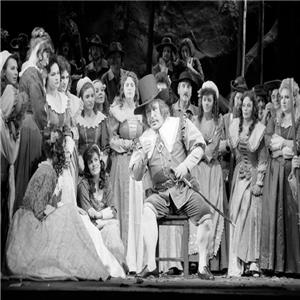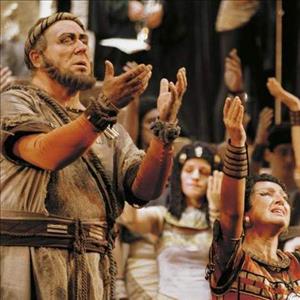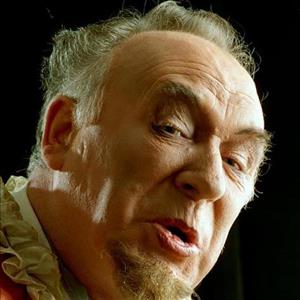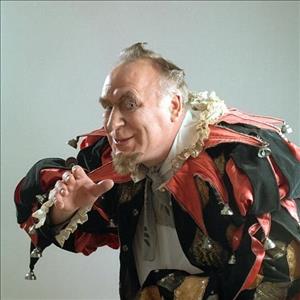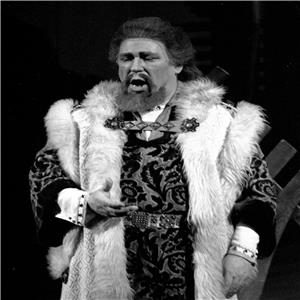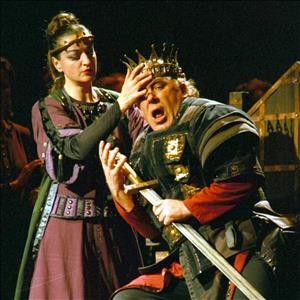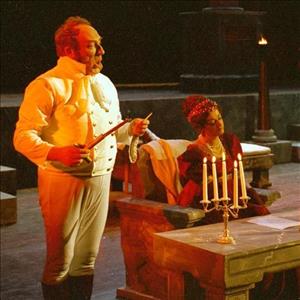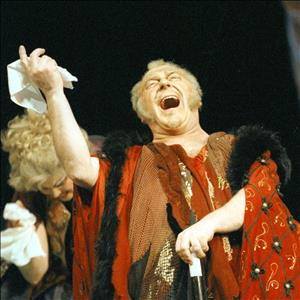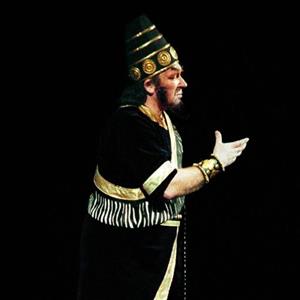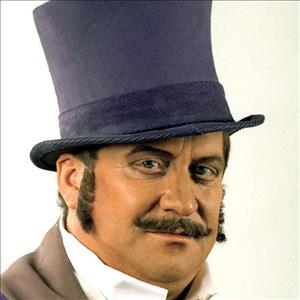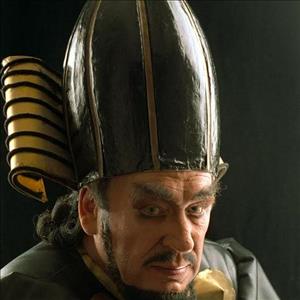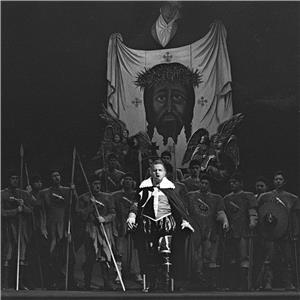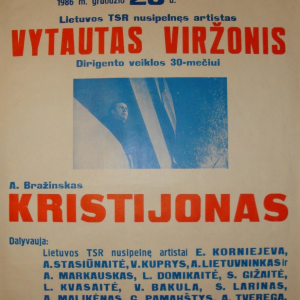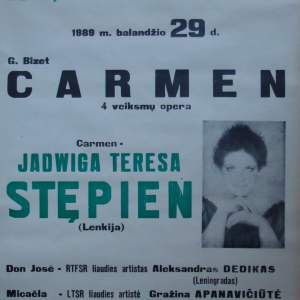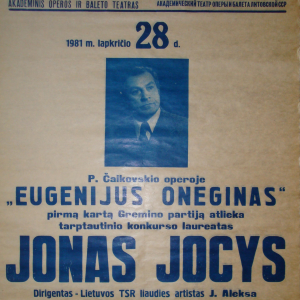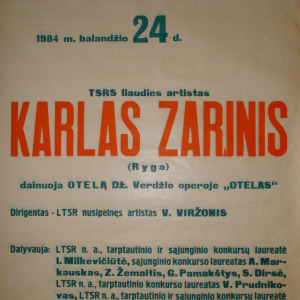
Arvydas Markauskas (baritone)

Arvydas Markauskas (b. 25 09 1951) came to Lithuanian National Opera and Ballet Theatre in 1980 after the graduation from the Lithuanian State Conservatory, the class of Virgilijus Noreika. Soon after, he consolidated himself among the main baritones and created parts like Onegin, Iago, Escamillo, Marcello, Count in "Der Wildschutz", Smirnov, etc. Later, in 1988 A. Markauskas performed his most favorite part of Rigoletto, which he considers being the king of baritone parts. Last decade in the creative biography of the singer is marked by other three roles in G.Verdi's operas: together with the part of Germont he performed Count di Luna, Macbeth and Nabucco. Parts like Scarpia, Erdvili, Zurga, Cuno and others have also supplemented the repertory of the soloist.
A. Markauskas started his life at the theatre during the studies. Then, he happened to work as a stagehand. Later he passed on to the mime and performed in ballet productions. Then, the future soloist appeared in the ballet "Giselle". According to the artist, it is very healthy to get acquainted with the "inner" mechanism of the theatre before making the debut as a singer. Then, you as if develop the ability "to tame" stage.
The singer has won laurels of many different competitions. During his study years in 1976 in Riga, the soloist was granted the second award. The singer remembers perfectly well his closing appearance with the famous conductor Jurij Silantjev. He became a laureate of the international competition in 1980 and of M. Glinka's Competition in 1981 (the chairman of jury I. Archipova). In 1986 A. Markauskas was conferred the name of the honoured artist to his deserts to the art of music theatre in Lithuania.
After Lithuania gained its independence and the borders were opened, A. Markauskas became a frequent visitor and assistant to the Lithuanian Opera in Chicago. He has performed in the following opera productions: "La Traviata", "Les Pecheurs de Perles", "L'elisir d'amore". Together with the troupe of the theatre A. Markauskas has taken part in the Splitt Opera Festival in Yugoslavia, where he appeared as Amonasro and Iago, awarded with the special prize, and in the Savonlinna Festival in Finland as Nabucco. He performed in "Don Carlos" in Germany, in "Otello" in Poland, also on stage of the Moscow Bolshoi Theatre, toured in St. Petersburg, Riga, and others.
A. Markauskas gives concerts, too. Together with his wife pianist Irena Čiurilaitė he has given a lot of evenings of chamber music. Together with Sigutė Stonytė soloist went on concert tour to seven cities of USA. A. Markauskas has taken part in two productions of C. Orff s scenic cantata "Carmina burana" under the conducting of professor J. Domarkas and maestro G. Rinkevičius. It was also performed in Italy. The soloist appeared in J. Brahms' "Ein deutsches Requiem". Dagon's prophet in C. Saint - Saens opera "Samson et Dalila" peformed by the singer under the conductor J.Domarkas is also noteworthy.
During 20 years of scenic experience the soloist has created a lot of dramatic parts of baritone, and he still gladdens the audience with his fine professional form, interestingly interprets grand operas like "Nabucco" and "miniatures" like Crespel and Luther from "Les Contes d'Hoffmann". Every time A. Markauskas comes on stage, his musical and velvety voice justifies G. Verdi's confidence in voice, when the human heart has to speak up.
Lithuanian Composers
Algimantas Bražinskas
Opera Kristijonas
Jurgis Gaižauskas
Opera Buratinas
Vytautas Klova
Opera Pilėnai (Margiris, Ūdrys)
Vygandas Telksnys
Opera Mažylis (Karlsonas)
Oratorios Cantatas Mass
Johannes Brahms
Ein deutsches Requiem
Carl Orff
Carmina burana
Opera
Georges Bizet
Carmen (Escamillo)
Les Pecheurs de Perles (Zurga)
Gaetano Donizetti
L'elisir d'amore (Belcore)
Albert Lortzing
Der Wildschutz (Count)
Wolfgang Amadeus Mozart
Don Giovanni (Masetto)
Jacques Offenbach
Les Contes d'Hoffmann (Luther, Crespel)
Amilcare Ponchieli
I Lituani (Erdvilis)
Giacomo Puccini
Tosca (Scarpia)
La Boheme (Marcello)
Gioachino Rossini
Il turco in Italia (Fiorilla)
Camille Saint-Saens
Samson et Dalila
Johann Strauss
Die Fledermaus (Frank)
Pyotr Tchaikovsky
Eugene Onegin (Onegin)
Giuseppe Verdi
Nabucco (Nabucco)
Macbeth (Macbeth)
Rigoletto (Rigoletto)
Otello (Iago)
Don Carlos (Rodrigue - marchese di Posa)
Il Trovatore (Count di Luna)
La Traviata (Germont)
Aida (Amonasro)
William Walton
The Bear (Smirnovas)
Carl Maria von Weber
Der Freischutz (Cuno)
The main colour of the part Posa is nobility, which is strong in A.Markauskas voice. The soloist as if once again justifies Verdi's confidence in voice, as the best means to express human feelings.
Jūratė Vyliūtė, Tiesa, February 13, 1982
Every performance fascinates with A.Markauskas scenic and vocal progress. Iago's part is one of the most complicated dramatic baritones of the repeertory. The soloist's powerful voice of beautiful timbre successfully overcomes all the difficulties. Ensemble stages, as well as chorus and orchestra environment can easily hear the singer's baritone.
Jurgis Dvarionas, Literatūra ir menas, December 10, 1983
I would ascribe A.Markauskas created count di Luna to the biggest attainments of the performance, as well as the soloist. This character in the game of triangle is an aggressive figure (king of spades). Di Luna created by Markauskas is tragic and generous, more a victim than a persecutor. The soloist's right vocalization of the part, vivd sound filled with inner tension, completely compensate for the minimum of acting elements. The part corresponds to the nature of voice, which he uses effectively. Kind, soft, as well as powerful and lively sounding of the voice, noble manner of singing and particularly expressive cantilena, ability as if to prolog the phrase attract the attention. After Markauskas entered his thirteenth season and sung such parts as Posa, Onegin, Iago, Escamillo and other main baritone parts, he found his biggest part in "Il Trovatore".
Jūratė Vyliūtė, 7 meno dienos, March 3, 1994
The baritone Arvydas Markauskas comes to assist the Lithuanian Opera in Chicago not for the first time. Kind and velvety voice, musically perceived form of Erdvilis' aria made good impression; the soloist loved by emigrants, was given a good reception.
Loreta Venclauskienė, Draugas, May 7, 1994
In the opera "Les Pecheurs de Perles" he (Arvydas Markauskas) created the part of Zurga. As always, Arvydas Markauskas thoroughly prepared the melodic text and perfectly felt the romantic style of music and the pulse of phrases.
Arvydas Markauskas is a real dramatic baritone, possessing an unusualy subtle shading. Moreover, he has always been a superb actor, performing on stage everything perfectly well. I can remember A,Markauskas Rigoletto. It was a nice picture of a loving father. The soloist was of perfect vocal form and his Rigoletto shone with special kindness and goodness. I performed Gilda. Our Both duets in act 1 and act 3 were very affectionate. I just enjoyed myself on stage. A,Markauskas' Frank in "Der Fledermaus" is inforgettable, full of temperament. He interestingly performs every part, even the smallest one. For instance, A.Markauskas performs the innkeeper Crespel in the opera "Les Contes d'Hoffmann" in such a way, that despite the other soloists and chorus, the eyes were turned to A.Markauskas' Crespel, because this singer lives on stage. He was born for that. A.Markauskas is a superb, kind person, singer and stage partner.
Danguolė Juodikaitytė, 2001
